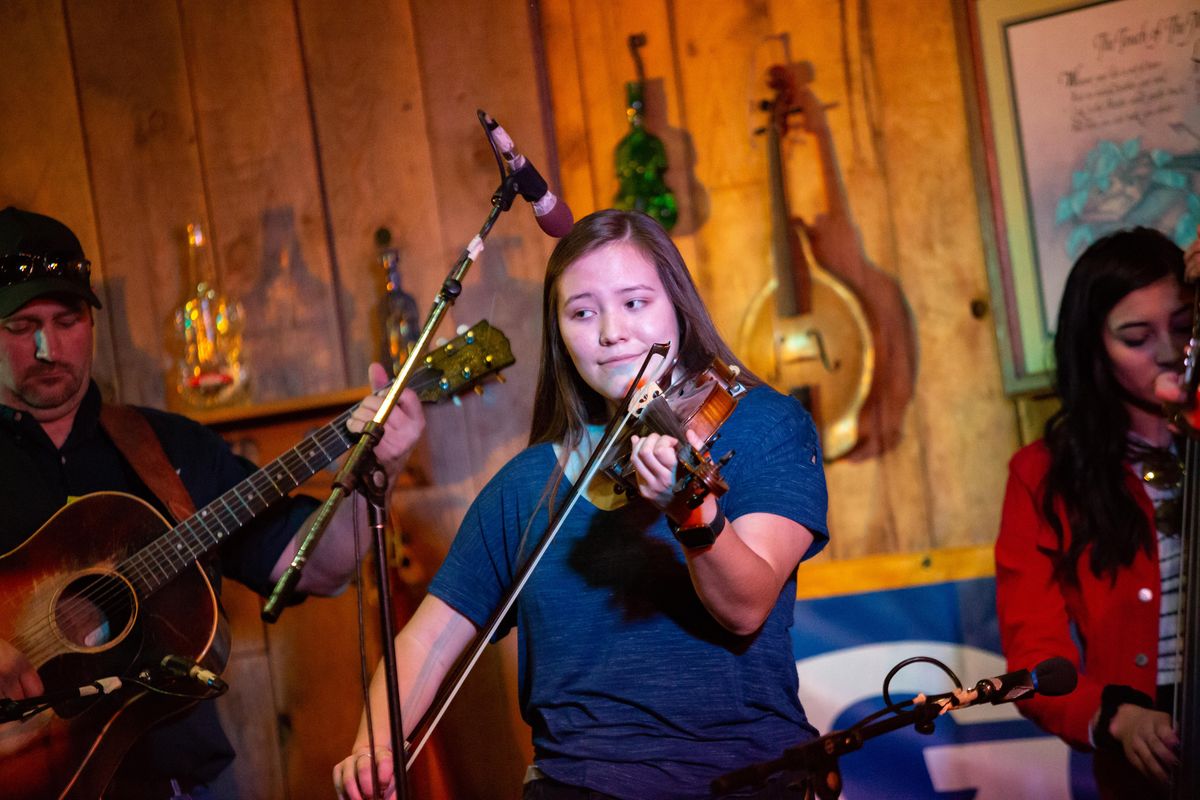Generations of fiddlers meet to compete: “Your fingers know where to go”

For Kelly Buckley, the most difficult part of Sunday’s fiddle contest was not tearing up when her daughter took the stage.
Buckley’s daughter, 4-year-old Maggie Buckley, is the fourth generation in a family of fiddle players, and told her parents she wanted to compete this January. Maggie, the youngest fiddle player at the competition, made it to the top five in her age group with her rendition of “Happy Birthday” and “Twinkle, Twinkle, Little Star.”
“Her dad and I were really proud,” Kelly Buckley said.
The Buckleys were among about 100 fiddle players and accompanists ages 4 to 94 who participated in the 51st annual Northwest Regional Fiddle Contest on Sunday.
Like many of the competitors at the show, playing the fiddle is a multigenerational tradition. Kelly Buckley’s husband, Taylor Buckley, began playing when he was around 4, and is the son and grandson of fiddle players.
Kelly Buckley said her daughters will never know their great-grandparents but she hopes they can feel close to them through music.
“I think it’s a really cool way to carry on a family tradition,” she said. “She’s not going to know the great-grandpa that played, but she’s going to have that connection to him.”
The Buckleys, who traveled from Missoula to participate, were among several families who drove across the Northwest to compete.
Ed Miller, president of the Northwest Regional Fiddle Contest, said competitors aren’t judged based on their age, appearance or performance style, but on their music alone. Each of the participants plays three songs – a hoedown, a waltz and a song of their choice – and their total performance must be under four minutes. Each of the competitors, who must memorize their sets, is accompanied by up to three other musicians, and judges listen to them through a sound system in a nearby room, where they can’t see the competitors. From there, the three judges choose the top competitors, who go on to play one final performance.
Both the oldest and youngest competitors, Maggie Buckley and 94-year-old Marge McFaul, made it to the top five.
McFaul, of Spokane, is a retired nurse who graduated from Sacred Heart Hospital’s nursing school and a mother of 10. She has spent decades performing. When she competes at fiddle contests, she always wears a pair of bright red cowgirl boots, and she stomped them at the end of her performance Sunday.
McFaul said she learned to play violin as a child, but was introduced to fiddling by a family band when she was about 13. She said they performed at a grange hall dance together when she was in her early teens, which would have been in the late 1930s.
She said 10 children and a career in nursing kept her busy, but she was able to participate in an orchestra in Pullman, and now is a member of Project Joy Orchestra, a local musical group for performers who are 50 or older.
She said she competed in her first fiddle contest, the National Oldtime Fiddlers’ Contest and Festival in Weiser, Idaho, when she was 69, and placed fourth. She said traveling all the way to Weiser is more difficult now and that she prefers to attend the Northwest Fiddle Contest in Spokane Valley because it’s closer to her home in Spokane.
She said many fiddlers, including herself, play by ear to learn their music, or just memorize it. When they compete at contests, they’re not allowed to have music in front of them, and have to perform a set from memory.
“When you’re playing, you don’t think of the next note, your fingers know where to go,” she said.

McFaul always asks Rod Anderson, the winner of the top accompanist award at the contest, to play alongside her. Anderson, who wins the award almost every year, accompanied 67 musicians over the two-day event.
Miller said the most competitive category during the festival is the open category, where people of any age can compete and most children who compete are 6 or older. Few children are as young as Maggie Buckley, the 4-year-old. Miller said his own daughter, now a teenager, was a competitor at 4.
He said most of the children who compete that young are just the latest generation of musical families.
“That’s the future,” he said. “You’ve got to perpetuate this style of music. That’s going to be the next generation of fiddle.”